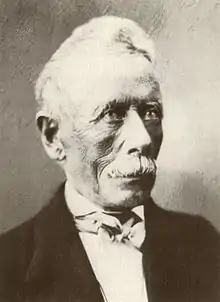Karl Moriz Diesing
Karl (Carl) Moriz (Moritz) Diesing (16 June 1800, in Krakow – 10 January 1867, in Vienna) was an Austrian naturalist and zoologist, specializing in the study of helminthology.

He studied medicine at the University of Vienna, earning his doctorate in 1826. Afterwards, he served as an assistant to botanist Nikolaus Joseph von Jacquin, later working as an intern at the Hof-Naturalien-Cabinet (from 1829). In 1836, he became a curator of the zoological collections.
In the late 1840s, he began to suffer from serious eye problems, and shortly afterwards experienced permanent blindness.[1]
His principal works include Systema Helminthum (2 vols., 1850–1851), and Revision der Nematoden (1861).
In his paper "Versuch einer monographie der Gattung Pentastoma" (Ann. Wien Mus. Naturges. 1836, 1–32), he was the first to establish the distinct nature of the Pentastomida, placing them in a new group which he called Acanthotheca.[2]
The genera Diesingia [3] and Diesingiella [4] are named after him.
References
- Biography @ Allgemeine Deutsche Biographie
- A systematic monograph of the Recent Pentastomida, with a compilation of their hosts by M.L. Christoffersen & J.E. De Assis
- WoRMS taxon details Diesingia Sambon, 1922
- Petymol Biographical Etymology of Marine Organism Names. D
- International Plant Names Index. Diesing.
External links
- Works by or about Karl Moriz Diesing at Internet Archive
- IPNI List of plants described.